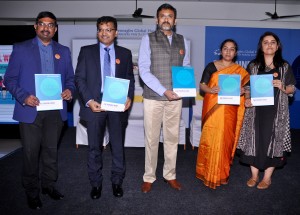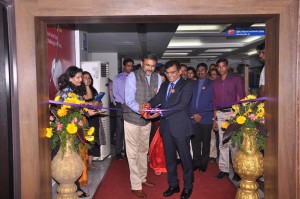 Photo Caption: (Left to Right) Dr. Gauthaman, Director of Medical Services, Gleneagles Global Health City, Dr. Raja Sundaram, Director – Gleneagles Global Institute of Oncology, Gleneagles Global Health City), Mr. Ramesh Krishnan, Chief Executive Officer, India Operations Division, Parkway Pantai Limited, Dr Rasika Bhat and Ms Dhara.
Photo Caption: (Left to Right) Dr. Gauthaman, Director of Medical Services, Gleneagles Global Health City, Dr. Raja Sundaram, Director – Gleneagles Global Institute of Oncology, Gleneagles Global Health City), Mr. Ramesh Krishnan, Chief Executive Officer, India Operations Division, Parkway Pantai Limited, Dr Rasika Bhat and Ms Dhara.
 Gleneagles Global Health City inaugurates ‘Unwait Zone’- An Experience Center in the Oncology Wing on World Cancer Day~
Gleneagles Global Health City inaugurates ‘Unwait Zone’- An Experience Center in the Oncology Wing on World Cancer Day~
Report Highlights:
- More than 50% respondents highlighted that GPs were not very effective in gauging the symptoms.
- Poor access to onco-physicians to confirm diagnosis was the prime difficulty according to 26% respondents.
- All the respondents had to perform multiple tests repeatedly while consulting different oncologists at different centers causing a delay according to 39% respondents.
- In the south, on an average the patients had visited 2.2 doctors before starting the treatment
- In the south, largely radiotherapy followed by Chemotherapy is the first step towards cancer treatment
- Key concerns highlighted by the patients in the journey are costly treatment options, hospitals not being geared to have all services under one roof, numerous tests performed at different centers and lack of emotional counselling through the cancer journey
Chennai, February 04, 2017: Gleneagles Global Hospitals, a Parkway Pantai enterprise, today released ‘Painful Wait’, a National Cancer Study on understanding the journey of Cancer patients in India. Dr. Raja Sundaram, Director – Gleneagles Global Institute of Oncology, Gleneagles Global Health City, Chennai, and one of the foremost Oncologists in the city presented the study at Gleneagles Global Health City, Perumbakkam. Mr. Ramesh Krishnan, Chief Executive Officer, India Operations Division, Parkway Pantai Limited and Dr. Gauthaman, Director of Medical Services, Gleneagles Global Health City, were also present at the event. The release was part of the World Cancer Day activities which included the inauguration of Unwait Zone, an experience center with entertainment facilities such as a Jukebox, an art corner and a repository of books and magazines for the patients and their family waiting in the Oncology wing. Mr. Ramesh Krishnan inaugurated Unwait Zone in the presence of few patients and Dr. Gouthaman.
‘Painful Wait’ is a national study covering 6 major Indian cities such as Bangalore, Mumbai, Delhi, Chennai, Kolkata and Hyderabad. Commissioned by Gleneagles Global Hospitals in collaboration with Sorento Health, ‘Painful Wait’ surveyed 600 cancer patients, survivors and caregivers. The study was a mix of quantitative face to face and online interviews of males and female respondents from the age group of 20 to 55 years. ‘Painful Wait’ indicated that initial symptom recognition and diagnosis, access to cancer diagnostic tests, multiple diagnostic tests, time taken from diagnosis to confirmation, poor access to oncologists, initiation of treatment, satisfaction with hospitals and cost of treatment were main areas of concerns for cancer patients and caregivers in India.
According to the report, when it came to initial symptom recognition, respondents from the south (97%) felt their family physicians were effective in understanding the symptoms. Owing to this 77% respondents from the South chose a specialist on their family physician’s recommendation. However, respondents in East (71%), West (69%) and North (47%) opined that their family physicians could not gauge the signs of cancer to correctly route them to a specialist. Delay in effectively gauging the signs of cancer at the primary care level delays timely diagnosis and treatment. Hence, the ability of the family physician to gauge early signs of cancer and patient awareness is crucial reported the study.
The report also showed that overall, less than half the respondents (46%) reported that cancer was detected at stage I, lowest being in the west (39%) and North (20%), were diagnosed only by stage IV. Despite the efficiency of family physicians, in the South, 63% of the respondents were diagnosed beyond stage I and 38% by stage II. While, 70% respondents got confirmation of diagnosis within 3 months, in west and south the value was low. This indicates the need for faster access to specialized tests, the availability of timely tests results and accurate interpretation to initiate treatment.
The report also showed that 70% of the respondents had to perform several tests on visiting different oncologists. Undergoing multiple tests was identified as the most frustrating pain point by patients and caregivers, especially from the South. 61% respondents from the South reported that the entire process of diagnosis requiring multiple level tests was the prominent reason causing delay in treatment. Every respondent in the south (100%) and 70% from the north were made to re-do these specialized tests. Another key concern highlighted in the report was the poor access to oncologists (49%). In the south, only 58% respondents received a confirmed diagnosis within 3 months, 32% respondents within 3-6 months and 11% respondents took over 6 months. Faster access to cancer specialists will avoid repeated tests and agony of patients, commented the study.
In the south, 47% of respondents were diagnosed with stage I cancer, 38% with stage II cancer, 12% with stage III cancer and 5% with stage IV cancer, according to the report. 87% of the patients in the south acknowledged that there were no delays in commencement of treatment. Respondents who had to suffer a delay in onset of treatment cited unavailability of specialists or slots for treatment, inadequacy of the patient’s body to cope with the chemotherapy dose and non-availability of recommended treatment as the key reasons for the delay in treatment. Reduction in time lag in onset of treatment post diagnosis can be achieved through easier access to onco-physicians, onco-surgeons and enhancement of facilities to cope with the demand.
Most respondents stated that their expectations from hospitals included accessibility to cancer specialists, quality & expertise of doctors, counselling services, cleanliness & hygiene and all-under-one-roof availability. In the south, especially Chennai, satisfaction level with most parameters while choosing a hospital were found higher than other regions. Patient engagement through counselling and timely access to healthcare facilities are clear need gaps to be fulfilled.
Respondents shared that costly treatment options, re-emergence of cancer, lack of counselling to deal with the emotional stress and access to oncologists were the key areas of concern in their personal experience.
Commenting on the report, Dr. Raja Sundaram, Director – Gleneagles Global Institute of Oncology, Gleneagles Global Health City, Chennai, said, “Painful Wait has given us an indication of the ordeal a cancer patient in India has to go through. The report has shed light on many cracks in the system that affects the proper diagnosis and treatment of cancer in our country. While I am glad that our city according to the report ranks higher on satisfaction while choosing a hospital than the other regions, it is still imperative that we listen to the patients and provide better access to oncologists and counselling to help them deal with emotional stress. I sincerely hope that this study creates awareness and helps the eco-system in India understand the gaps to create a better path to recovery for cancer patients.”
During the Inauguration of the Unwait Zone, Mr. Ramesh Krishnan, Chief Executive Officer, India Operations Division, Parkway Pantai Limited, said, “According to the Indian Council of Medical Research (ICMR), the projected figure for new cancer cases in 2016 was 14.5 lakhs and by 2020, the number is expected to rise exponentially to 17 lakhs. These numbers are alarming and require collaborative action at both individual and collective levels to make big strides in the fight to cure cancer. We are making a beginning towards serving the unmet needs of patients by creating a pathway, ensuring better patient experience. Through the findings from the research commissioned by us, we will use it to make necessary changes in the way we practice, both clinically and non clinically. Through such initiatives we need to demonstrate control strategies to spread awareness for early detection of cancer and reduce its devastating impact. We also aim to strengthen our resources and provide the best training to meet this increased patient load and deliver quality healthcare.”


